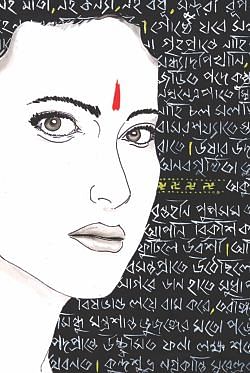A Beauty Spot of Bangla Language
A Beauty Spot of Bangla Language

You might have already noted this since the time you tried to understand the eloquence of Bangla language, but there's no reason why this beauty should not be highlighted over and over again. So here's another reason why we should take pride in our mother tongue - Bangla is a genderless language.
A genderless language is one which does not distinguish between man and woman grammatically (Braun, Friederike. "Gender in a Genderless Language: The Case of Turkish." Language and Society in the Middle East and North Africa: Studies in Variation and Identity). Bangla language, then, is gender-friendly because with single words used as pronouns, it refers to all genders without any bias. Hence, without using specific gendered subject pronouns of 'he' or 'she', the word 'shey' is used. Also, objective genderless pronouns 'tar' (tar/ta'kay) or 'o' (o/ o'kay) is used in place of 'him' or 'her'. These genderless pronouns are comfortably used by millions of Bengali-speaking people in our country and all around the world. This, dear readers, is pretty cool.
People generally face irritation when using the words 'he or she'. I certainly do and I'm sure majority of the people who are extra conscious about the content of their speech go through it too. When a person has to use pronouns in the process of articulating an idea – be it through writing or giving a speech – this is one trouble he or she (there you go!) may face. This can actually disturb the way ideas are being presented and distract the audience or readers from focusing on the main claims/ideas/content. This is especially true when someone is giving a speech. Many tend to stick to one subject pronoun, however, for a smooth flow of the expression of thought. It's easier that way.
A person who is a part of an institution or organization where English is the mode of communication will find this act of picking a pronoun rather bothersome. There have been moments of confusion several times in my life when I was speaking in public and needed to pick a pronoun to use. I could not decide whether I should say 'he' or 'she'. People in my situation continue with one pronoun, perhaps justifying that no one pays heed to which pronoun they use. But, when I was in the aforementioned situation, I faced trouble in clearly expressing myself. It was disturbing.
Here's why I felt disturbed: there's silent anger and frustration within myself after seeing and hearing the use of 'he' all the time when people try to use one pronoun to refer to a man or a woman. It isn't only that men use this, women also use it. Why does this occur? Frequent use of 'he' in English books or other write-ups, both academic and non-academic, is to be blamed. But what can the poor writers do if the language itself is biased? They certainly have a choice, but selecting and continuing with one pronoun would in turn be a matter of bias, no matter which one they choose.
The male dominated society which exists today is also partially to blame for this. Our history and our old civilizations wrapped around patriarchal ideologies generated gender biases in languages such as English, the use of which is prevalent in Bangladesh. Most spoken languages in the world today make the distinction of gender in their languages. There are very few countries which make that distinction. For example, Sweden, Norway and Bangladesh.
We communicate through our own respective languages and it is quite obvious how profoundly this shapes our mindset and thoughts. Frequent use of gendered languages in writing and speech affects our mentality. If someone subconsciously uses 'he' while writing or speaking to refer to a person of any gender, it may imply to others that you value 'men' above 'women'. This might not necessarily be a bad thing and might not be the case too, but why should I have to assume that 'he' or 'she' refers to a person, regardless of their gender? This, I believe is a flaw in English language. Attempts have been made to use a gender-neutral English pronoun, such as 'Ze', but they have failed to be used globally.
I am proud of my Bangla language, for it doesn't distinguish between man and woman, he or she. It's one step towards working and communicating together to successfully narrow the existing gender gap in our country.